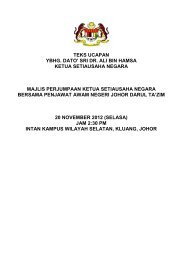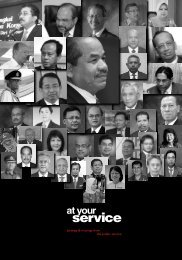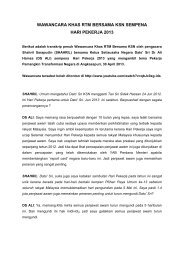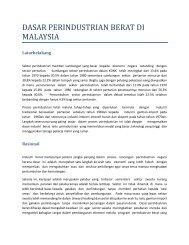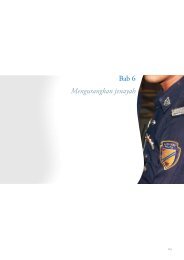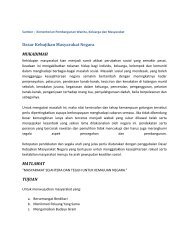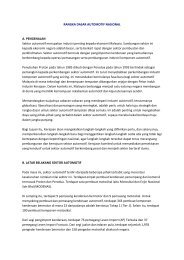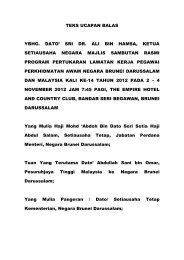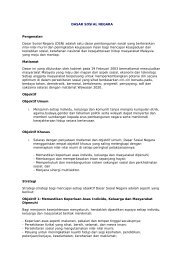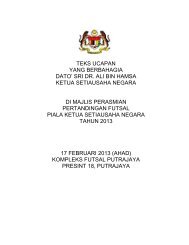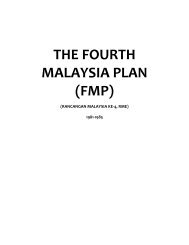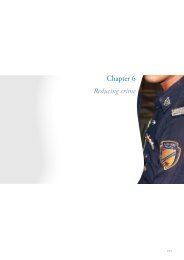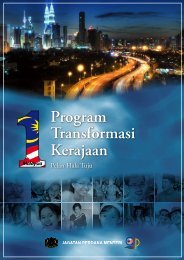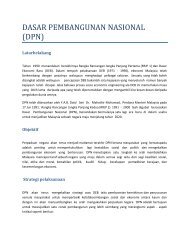GTP 2.0 - Prime Minister's Office of Malaysia
GTP 2.0 - Prime Minister's Office of Malaysia
GTP 2.0 - Prime Minister's Office of Malaysia
You also want an ePaper? Increase the reach of your titles
YUMPU automatically turns print PDFs into web optimized ePapers that Google loves.
School Improvement<br />
Programme<br />
New deals and New<br />
Principal Career<br />
Package<br />
New Teacher Career<br />
Package<br />
upskilling English<br />
Teachers<br />
I think changes like these take time. For me, the<br />
government’s initiatives to improve the quality<br />
<strong>of</strong> teachers and education standards are good.<br />
It’s the starting point for changes in the nation<br />
to take place.<br />
Mohd Khairul Azim, 24<br />
Lawyer<br />
To further enhance the performance <strong>of</strong> schools, <strong>GTP</strong> <strong>2.0</strong> will<br />
empower District Education <strong>Office</strong>s with the authority to provide<br />
relevant support and aid for underperforming schools. The objective<br />
here is to create central hubs that have the resources and powers<br />
to support and improve schools within their jurisdictions.<br />
In addition to the New Deal opportunities <strong>of</strong>fered to principals<br />
and head teachers, this enhanced initiative will also streamline the<br />
appointment process transforming it into a performance-based system.<br />
It will also create a comprehensive succession plan to ensure that every<br />
school will be staffed by a principal or head teacher at all times.<br />
This new initiative shares its roots with the Principal Career<br />
Package. The EDU NKRA recognises that teachers are at the very front<br />
lines <strong>of</strong> the education system, and this initiative will transform<br />
teacher compensation from a tenure-based system to a performancebased<br />
one.<br />
The results from the CPT show that there is a need to further enhance<br />
pr<strong>of</strong>iciency and pedagogical competencies <strong>of</strong> English language<br />
teachers in the system. This initiative aims to bring teachers’ English<br />
pr<strong>of</strong>iciency up to the international standards through a series <strong>of</strong><br />
focused and effective pr<strong>of</strong>essional development programmes.<br />
The EDU NKRA is also cognisant <strong>of</strong> the fact that Preliminary<br />
Report <strong>of</strong> the <strong>Malaysia</strong> Education Blueprint (MEB) was<br />
launched in Spetember 2012, and hence there is a need to<br />
harmonise the initiatives <strong>of</strong> <strong>GTP</strong> <strong>2.0</strong> with the objectives <strong>of</strong> the<br />
MEB. Both the <strong>GTP</strong> and MEB are working towards the same<br />
goals in this regard, and the latter functions to provide a<br />
clearer long-term focus to the direction <strong>of</strong> transformation.<br />
<strong>GTP</strong> <strong>2.0</strong> builds on the foundation established by <strong>GTP</strong> 1.0<br />
through the introduction <strong>of</strong> new, specific initiatives such as<br />
the New Principal and Teacher Career Package, which is an<br />
extension <strong>of</strong> the New Deal programme implemented in <strong>GTP</strong><br />
1.0. The next three years will also see greater emphasis placed<br />
on further strengthening foundations by focusing efforts on<br />
improving basic English literacy.<br />
The NKRA’s efforts in <strong>GTP</strong> <strong>2.0</strong> will also respond to<br />
concerns voiced by the rakyat that insufficient attention is<br />
being paid to establishing basic education foundations, which<br />
is a key action item in the MEB.<br />
THREE ASPIRATIONS IDENTIFIED FOR THE MALAYSIAN EDUCATION SYSTEM<br />
National<br />
Education<br />
Blueprint<br />
2013 – 2025<br />
<strong>GTP</strong> <strong>2.0</strong><br />
2013 – 2015<br />
ACCESS QUALITY EQUITY<br />
Universal enrolment<br />
across all levels from<br />
pre-school to upper<br />
secondary by 2020<br />
From stagnant enrolment<br />
today to developed nation<br />
levels<br />
98% Primary<br />
90% Lower Secondary<br />
85% Upper Secondary<br />
Top third <strong>of</strong> countries in<br />
international assessments<br />
such as Programme for<br />
International Student<br />
Assessment (PISA) and<br />
Trends in International<br />
Mathematics and Science<br />
Study (TIMMS) in 15 years<br />
(improving from the<br />
bottom-third today).<br />
<strong>Malaysia</strong> as one <strong>of</strong> the<br />
fastest improving systems<br />
ever in the world, in<br />
15 years<br />
92% pre-school At international average in<br />
international assessments<br />
such as PISA, TIMSS*<br />
50% reduction in<br />
achievement gaps<br />
(urban -rural,<br />
socio-economic,<br />
gender) by 2020<br />
<strong>Malaysia</strong> as one <strong>of</strong> the<br />
world’s most equitable<br />
school systems<br />
25% reduction in<br />
urban-rural achievement<br />
gaps across <strong>Malaysia</strong>*<br />
haRmoNIsatIoN WIth thE<br />
malaysIa EDuCatIoN bluEPRINt (mEb)<br />
The <strong>Malaysia</strong>n Education Blueprint (MEB) represents the<br />
ambitions <strong>of</strong> the Government to create an education system<br />
in <strong>Malaysia</strong> that is on par with the best in the world by 2025.<br />
The MEB is the result <strong>of</strong> an extensive review <strong>of</strong> the existing<br />
education system conducted in October 2011, which polled<br />
a number <strong>of</strong> sources including local teachers and parents<br />
and international organisations such as UNESCO and the<br />
World Bank.<br />
110 Government transformation Programme—Annual Report 2012 Chapter six 111<br />
Government transformation Programme—Annual Report 2012 Chapter six



